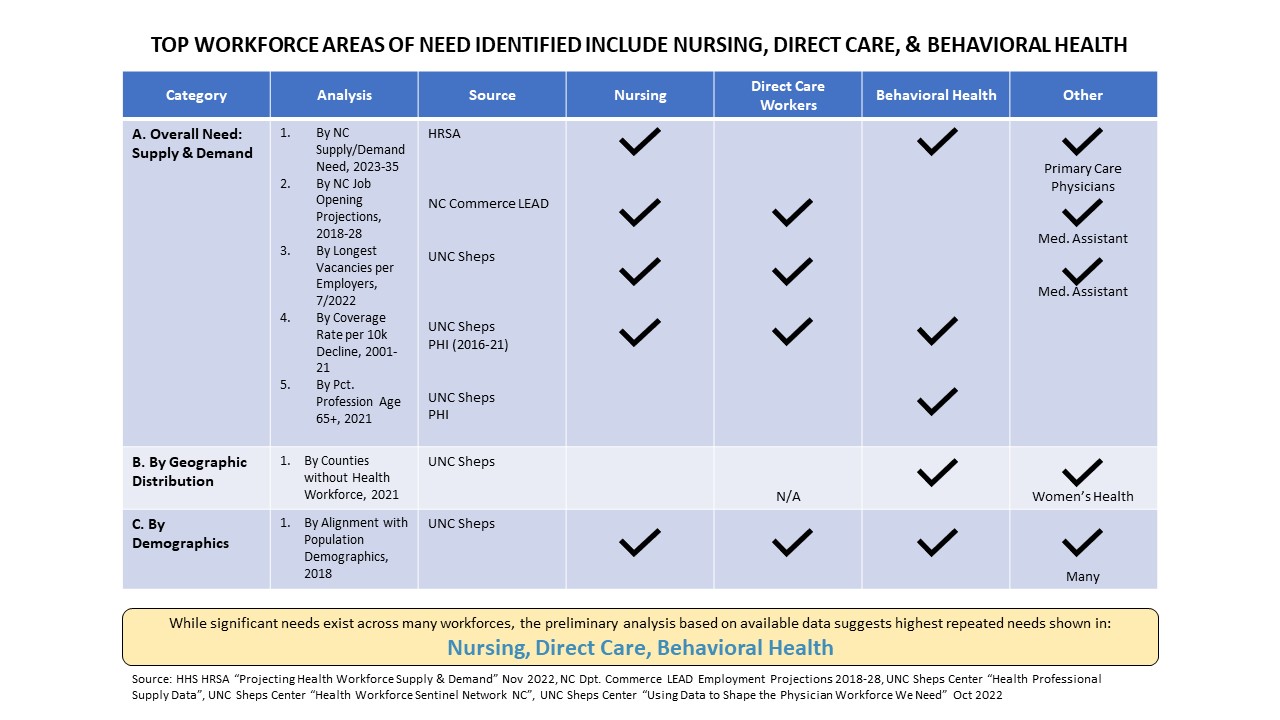Identifying Priorities in North Carolina’s Workforce for Health

Through our Institute for Workforce Competitiveness, the NC Chamber Foundation is shifting into action to tackle our state’s workforce challenges. The health care industry is inextricably tied to the wellbeing of every community, every business in our state, and North Carolina’s long-term success.
This month, our Foundation Forecast features guest insights from Kathy Colville, president and CEO of the North Carolina Institute of Medicine. We are excited to collaborate with Kathy through our partnership with the North Carolina Center on the Workforce for Health. Together we are working to implement the Talent Pipeline Management framework in North Carolina to address our health workforce shortages. As state leaders reach consensus on the expansion of Medicaid, we are looking ahead to the increase in demand for health services and the need for an expanded and upskilled health care workforce.
Learn more about the workforce challenges in this Forecast and let us know if you would like to stay informed and engage with us on this work.
Meredith Archie
President
NC Chamber Foundation
Identifying Priorities in North Carolina’s Workforce for Health
Even before the impact of the COVID-19 pandemic, our state was facing a workforce shortage in our “workforce for health” – the team of clinicians and support staff that coordinate daily to provide preventive care, health education, diagnosis, treatment, and compassionate care.
When the pandemic hit in 2020, North Carolina’s staff-per-resident ratio in public health had decreased by 18% over the previous decade. The remaining workforce responded heroically to the unprecedented need, but that experience led to a crisis of burnout, retirements, and morale issues.
Many North Carolina nurses left the workforce during the pandemic and later returned, but not to our hospitals and long-term care facilities; more often, they have moved to other roles in nursing. According to NC Nursecast, a project of the Sheps Center for Health Services Research at UNC Chapel Hill, North Carolina can expect a shortage of nearly 12,500 registered nurses and 5,000 LPNs by 2033.

Figure 1: RN Supply and Demand under Baseline Model vs. RNs Exiting Workforce Five Years Earlier.
Source: NC Nursecast

Figure 2: Synthesis of Data Identifying Top Workforce Areas of Needs in North Carolina
Source: Data compiled and synthesized by NC Department of Health and Human Services
A synthesis of healthcare workforce needs, conducted by the North Carolina Department of Health and Human Services, identified priorities along three dimensions: gaps in supply and demand, geographic distribution, and demographic representation. This analysis identified nursing, the direct care workforce (such as home health aides and nursing assistants), and behavioral health workers as the areas of highest priority in North Carolina. Primary care, medical assistants, and women’s health were identified as additional areas of emphasis.
During the pandemic, the Sheps Center and North Carolina Area Health Education Centers gathered sentinel data from employers about their workforce needs. Employers’ comments help illuminate the difficulties of competition—between urban and rural areas, between sectors in health care that can pay more than others, and with sectors outside of health care that offer less demanding work at similar or better wages.
“Significant turnover and burnout in the nursing staff leading to severe shortage of nurses. Unable to fill hospital beds due to this staff shortage.”
“Team has been kicked out of rental housing for entrance into the short-term rental market or to sell and make a large profit; team members can’t afford to stay here and leave.”
“People are exhausted. Wage wars are raging. Traveling has become rampant. Resilience is low.”
This information is sobering, but in response to the challenge there are teams of people across our state developing innovative responses and solutions.
The NC Chamber Foundation and the North Carolina Center on the Workforce for Health are forming a landmark partnership to aggressively tackle the state’s health workforce shortages. Through the Talent Pipeline Management framework in North Carolina, this partnership will engage local partners in employer-led collaboratives in three regions to start and coordinate workforce development solutions that meet the needs of businesses and their workers. The NC Chamber Foundation and the North Carolina Center on the Workforce for Health are also engaging local leaders and state-level stakeholders to build support for this approach and related implementation efforts.
Are you interested in this work? Click here to stay informed and/or get engaged.